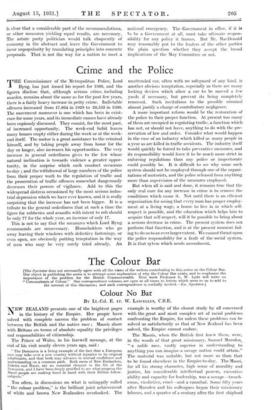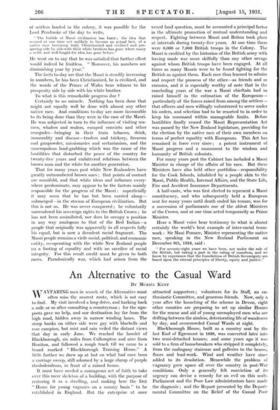The Colour Bar
[The Spectator does not necessarily agree with all the views of tho writers contributing to this series on the Colour Bar. Our object in publishing the series is to attempt some explanation of why the Colour Bar exists, and to omphaaizo the importance of the problem for the British Commonwealth. Next week Professor L. W. Lyda will write on !‘ Concomitants of Colour." Our correspondence columns are open at all times to letters which seem to us to add to the interest of this discussion; and such correspondence is cordially invited.—En. Spectator.] Colour No Bar By Lt.-Col. E. FF. W. LASCELLES, C.B.E.
NEW ZEALAND presents one of the brightest pages in the history of the Empire. Her people have solved with complete success the problem of contact between the British and the native race ; Maoris share with Britons on terms of absolute equality the privileges and responsibilities of citizenship.
The Prince of Wales, in his farewell message, at the end of his visit nearly eleven years ago, said : "The Dominion is a living example of the fact that a European race may take over a new country without injustice to its original inhabitants, and that both may advance in mutual confidence and understanding on a common path. Both races of New Zealanders, Pakeha and Maori, are an essential element in the life of the Dominion, and I have been deeply gratified to see what progress the Maori people are making hand in hand with their British fellow- subjects."
Too often, in discussions on what is unhappily called "the colour problem," is the brilliant joint achievement of white and brown New Zealanders overlooked. The example is worthy of the closest study by all concerned with the great and most complex set of racial problems confronting the Empire, for unless these problems can be solved as satisfactorily as that of New Zealand has been solved, the Empire cannot endure.
The Maoris, when the British first knew them, were, in the words of that great missionary, Samuel Marsden, "a noble race, vastly superior in understanding to anything you can imagine a savage nation could attain." The material was suitable, but not more so than that to be found elsewhere in the Empire to-day. The Maori, for all his strong character, high sense of morality and justice, his considerable intellectual powers, executive ability and capacity for leadership, was a savage—treach- erous, vindictive, cruel—and a cannibal. Some fifty years after Marsden and his colleagues began their missionary labours, and a quarter of a century after the first shipload of settlers landed in the colony, it was possible for the Lord Pembroke of the day to write,
'The bubble of Maori civilization has burst ; the idea that seemed at one time not unlikely to become an actual fact, of a native race becoming truly Christianized and civilized and pro- spering side by side with their white brothers has gone where many a noble and well-fought-for idea has gone before."
He went on to say that he was satisfied that further effort would indeed be fruitless. "Moreover, his numbers are diminishing year by year."
The facts to-day are that the Maori is steadily increasing in numbers, he has been Christianized, he is civilized, and the words of the Prince of Wales bear witness to his prosperity side by side with his white brother.
To what is this remarkable progress due ?
Certainly to no miracle. Nothing has been done that might not equally well be done with almost any other native race. And conditions to-day are more favourable to its being done than they were in the case of the Maori. He was subjected in turn to the influence of visiting sea- men, whalers and sealers, escaped convicts and other renegades—bringing in their train tobacco, drink, immorality and disease—traders and trickery, firearms and gunpowder, missionaries and sectarianism, and the unscrupulous land-grabbing which was the cause of the hostilities that disturbed the peace of the country for twenty-five years and embittered relations between the brown man and the white for another generation.
That for many years past white New Zealanders have greatly outnumbered brown ones ; that points of contact are manifold, and that white ideas and influence every- where predominate, may appear to be the factors mainly responsible for the progress of the Maori : superficially it may seem that he has but been carried along- submerged—in the stream of European civilization. But this is not so. He was never conquered ; he voluntarily surrendered his sovereign rights to the British Crown ; he has not been assimilated, nor does he occupy a position in any way analogous to that of the Red Indian—a people that originally was apparently in all respects fully his equal, but is now a decadent racial fragment. The Maori people remains a virile social, political, and economic entity, co-operating with the white New Zealand people on a footing of equality and with no sacrifice of racial integrity. For this result credit must be given to both races. Paradoxically war, which had arisen from the vexed land question, must be accounted a principal factor in the ultimate promotion of mutual understanding and respect. Fighting between Maori and Briton took place at intervals during twenty-five years. At one time there were 6,000 or 7,000 British troops in the Colony. The Maori is credited by the historian of the British army with having made war more skilfully than any other savage against whom British troops have been engaged. At all times as many Maoris were to be found fighting for the British as against them. Each race thus learned to admire and respect the prowess of the other—as friends and as enemies, and it is especially worthy of note that in the concluding years of the war a Maori chieftain had so raised himself in the estimation of the Europeans— particularly of the forces raised from among the settlers— that officers and men willingly volunteered to serve under his orders, and selection had to be resorted to in order to keep his command within manageable limits. Before hostilities finally ceased the Maori Representation Act was passed by the New Zealand legislature, providing for the election by the native race of their own members on terms of perfect equality with Europeans. This Act has remained in force ever since ; a potent instrument of Maori progress and a monument to the wisdom and humanity of British colonists.
For many years past the Cabinet has included a Maori Minister in charge of the affairs of his race. But these Ministers have also held other portfolios—responsibility for the Cook Islands, inhabited by a people akin to the Maori, Public Health, Internal Affairs, and the State Life, Fire and Accident Insurance Departments.
A half-caste, who was first elected to represent a Maori constituency, and who subsequently held a European seat for many years until death ended his tenure, was for a succession of parliaments one of the ablest Ministers of the Crown, and at one time acted temporarily as Prime Minister.
Hear a Maori voice bear testimony to what is almost certainly the world's best example of inter-racial team- work : Sir Maui Pomare, Minister representing the native race, speaking in the New Zealand Parliament on December 9th, 1918, said :
• "For seventy-eight years we have been, not under the rule of the British, but taking a part in the ruling of ourselves, and we know by experience that the foundations of British Sovereignty are based upon the eternal principles of liberty, equity and justice."































 Previous page
Previous page